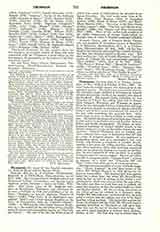

Thompson, the name of two English converts: (I) Edward Healy and (2) Harriet Diana.
EDWARD HEALY, b. at Oakham, Rutlandshire, England; d. at Cheltenham, Gloucestershire, on May 21, 1891. He was educated at Oakham school and Emmanuel College, Cambridge; and having taken Anglican orders, obtained a curacy at Calne, Wiltshire. After some years of the Anglican ministry at Marylebone, Ramsgate, and elsewhere, he became a Catholic in 1846 and published as his defense: “Remarks on certain Anglican Theories of Unity” (1846); “The Unity of the Episcopate considered” (1847); and “A few earnest thoughts on the Duty of Communion with the Catholic Church” (1847). In 1851 jointly with James Spencer Northcote (q.v.) he undertook the editorship of the valuable series of controversial pamphlets known as “The Clifton Tracts”. The rest of his life, the latter years of which were spent at Cheltenham, he devoted to religious literature. His chief works were: lives of M. Olier (1861), Marie Harpain (1869), St. Stanislaus Kostka (1869), Baron de Rentz (1873), and Henri-Marie Boudon (1881); “Devotion to the Nine Choirs of Holy Angels” (1869); “The Life and Glories of St. Joseph” (1888); and “Before and After Gunpowder Plot” (1890). Most of this useful work consisted in the skillful adaptations of foreign books which he thought were of value to English-speaking Catholics.
HARRIET DIANA, wife of Edward Healy Thompson, and daughter of Nicholson Calvert of Humsden, b. at Humsden, Hertfordshire, 1811; d. at Cheltenham, Gloucestershire, August 21, 1896. On her husband’s conversion she also joined the Catholic Church, and like him devoted herself to literary work. Her chief work is the “Life of Charles Borromeo”, but her stories of Catholic life won considerable popularity. These include: “Mary, Star of the Sea” (1848); “The Witch of Malton Hill”; “Mount St. Lawrence” (1850); “Winefride Jones” (1854); “Margaret Danvers” (1857); “The Wyndham Family” (1876); and others, as well as articles in “The Dublin Review”.
EDWIN BURTON

